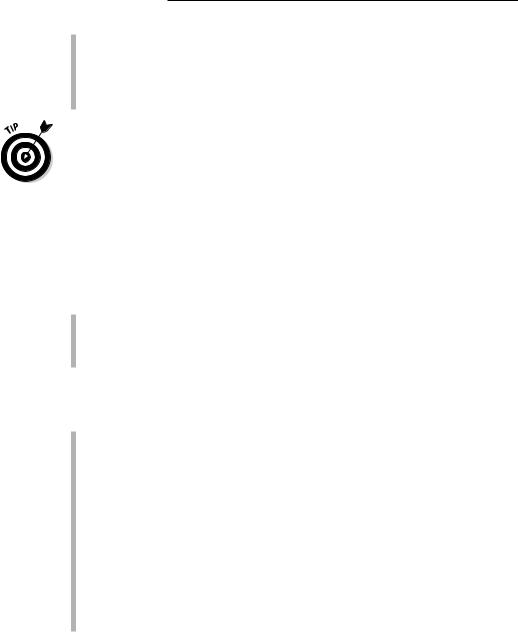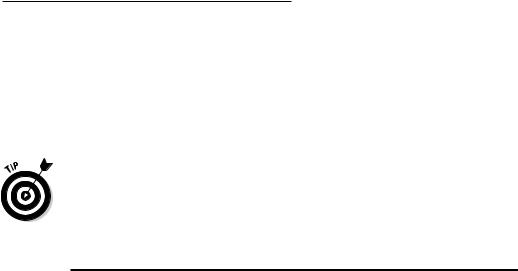
- •About the Authors
- •Dedication
- •Acknowledgments
- •Table of Contents
- •Introduction
- •About This Book
- •Conventions Used in This Book
- •Foolish Assumptions
- •How This Book Is Organized
- •Icons Used in This Book
- •Where to Go from Here
- •The French You’re Familiar With
- •Idioms and Popular Expressions
- •Key Parts of Speech
- •Cavorting with Verbs
- •Forming Sentences and Questions
- •The French Alphabet
- •Uttering Vowel and Consonant Sounds
- •Greetings: Formal and Friendly
- •Asking Questions to Get to Know People
- •Counting Your Lucky Stars: Numbers
- •Using the Calendar and Dates
- •Telling Time in French
- •Discussing Where You Live with the Verb “Habiter”
- •Discussing Daily Routine with Reflexive Verbs
- •Using Possessive Adjectives to Introduce Your Family Members
- •Basic Questions and Polite Expressions
- •Stating Your Preferences
- •Talking about Your Livelihood
- •Chatting about the Weather
- •Deciding to Keep in Touch
- •Getting Direction about Directions
- •Dining Out
- •Going to the Market
- •Going Shopping
- •Going Out with the Verb “Sortir”
- •Having Fun with the Verb “S’amuser”
- •Oh, the Places You’ll Go!
- •Making Plans with Friends
- •Making a Phone Call
- •Livin’ in the Past: Using the Past Tense
- •Playing Sports and Games
- •Going to the Beach
- •Setting Up Camp
- •Enjoying Quieter Pursuits
- •Where Do You Want to Go?
- •Getting Ready for Your Trip
- •Getting Current with Currency
- •Going to the Bank
- •Using Credit Cards and ATMs
- •Getting through the Airport
- •Navigating Buses, Trains, and Subways
- •Getting Around by Car
- •Finding Accommodations
- •Checking In to a Hotel
- •Checking Out of a Hotel
- •Getting Help Fast
- •Getting Medical Help
- •Handling Legal Matters
- •Label the Things in Your House
- •Write Your Shopping Lists in French
- •Listen to French Music
- •Watch French Movies
- •Tune in to TV5
- •Read French Publications
- •Take a Class
- •Join a French Association
- •Join an Online Chat or Pen Pal Forum
- •Using “Tu” When You Mean “Vous”
- •Using “Bonne nuit!” for Good-Bye
- •Using “Garçon” or “Porteur” to Address Service Staff
- •Saying “Je suis excité(e)” to Indicate Excitement
- •Saying “Je suis chaud(e)/froid(e)” to Say You’re Hot or Cold
- •Saying “Je suis plein/e” to Mean You’re Full
- •Using “de la glace” to Request Ice
- •Using “Je suis . . . ans” to Tell Your Age
- •Asking for Change with “J’ai besoin de change”
- •Using the Verb “Visiter” in Reference to People
- •“À mon avis”
- •“C’est pas vrai”
- •“Avec plaisir”
- •“C’est génial”
- •“À votre santé”
- •“À vos souhaits”
- •“Quelle horreur!”
- •“À bientôt”
- •“Passez-moi un coup de fil!”
- •“On y va!” or “Allons-y!”
- •“Je n’en sais rien”
- •“Je n’en reviens pas”
- •“Ça vaut la peine”
- •“C’est pas grave”
- •“N’importe”
- •“Tu cherches midi à 14h”
- •“Prenons un pot!”
- •Regular French Verbs
- •Auxiliary French Verbs
- •Track Listing
- •Customer Care
- •Index

Chapter 17: Handling Emergencies 285
Pharmacy hours are usually Monday to Saturday 9:00 a.m. to 7:00 p.m. and closed on Sundays. For night and Sunday hours, there is always une pharmacie de garde (ewn fahr-mah-see duh gahrd) (a 24-hour pharmacy [Literally: a pharmacy on duty]) nearby.
Braving the dentist
Anything can happen while traveling. You may get une rage de dents (ewn razh duh dahN) (a violent toothache) or lose a filling. If this happens, you can ask for the name of a local dentiste (dahN-teest) (dentist) at your hotel or inquire at the nearest pharmacy. Here’s some vocabulary pertaining to common ailments involving your teeth:
un abcès (uhN-nahp-seh) (an abscess)
une couronne cassée (ewn kooh-rohn kah-sey) (a broken crown)
la dent (sensible) (lah dahN [sahN-see-bluh]) ([sensitive] tooth)
les gencives saignantes (ley zhahN-seev seh-nyahNt) (bleeding gums)
le plombage est tombé (luh plohN-bahzh eh tohN-bey) (the filling fell out)
Handling Legal Matters
Most vacations and trips take place without any sort of issues that would require you to talk to the police or need help from your consulate. But occasionally, you may find yourself in a situation where such conversations are necessary. Perhaps your wallet or purse has been stolen, you’ve been involved in or have witnessed an accident, or you’ve lost your passport. This section provides you with the information you need to deal with such incidents if they should occur.
Talking to the police
You should report any accident, emergency, theft, and so on to le commissariat de police (luh koh-mee-sah-ree-aht duh poh-lees) (the police station) in major cities or to la gendarmerie (lah zhahN-dahr-muh-ree) in smaller towns. (See the earlier section “Getting Help Fast” for emergency numbers.) To find the nearest police station, you can say Où est le commissariat de police
le plus proche? (ooh eh luh koh-mee-sah-ree-aht duh poh-lees luh plew prohsh?) (Where is the closest police station?). Once there, you can explain your purpose by saying Je veux signaler . . . (zhuh vuh see-nyah-ley) (I want to report . . .) and filling in with the following phrases:
www.ATIBOOK.ir

286 Part III: French on the Go
un accident (uhN-nah-ksee-dahN) (an accident)
une agression (ew-nah-greh-syohN) (a mugging)
un cambriolage (uhN kahN-bree-oh-lahzh) (a burglary)
un vol (uhN vohl) (a theft)
At this point, the conversation is likely to go beyond the French you know. In that case, you can say Est-ce qu’il y a quelqu’un qui parle anglais? (ehs-keel ee ah kehl-kuhN kee pahrl ahN-gleh?) (Is there anyone who speaks English?)
Reporting an accident
In the event of an accident, report the accident to un agent de police (uhN- nah-zhahN duh poh-lees) (a police officer) to make a report of major accidents in towns, or to un gendarme (uhN zhahN-dahrm) (a police officer) for accidents on country roads. You can say Il y a eu un accident. . . . (eel ee ah ew uhN-nah-ksee-dahN. . . .) (There has been an accident. . . .) and then follow this with these phrases:
sur l’autoroute (sewr loh-toh-rooht) (on the highway)
sur la route (sewr lah rooht) (on the road)
près de…. (preh duh…) (near. . . .)
When the police arrive, they usually ask a great many questions, such as the following:
Est-ce que je peux voir votre . . . ? (ehs-kuh zhuh puh vwahr vohh-truh) (Can I see your . . . ?)
permis de conduire (pehr-mee duh kohN-dweer) (driver’s license)
carte d’assurance (kahrt dah-sew-rahNs) (insurance card)
carte grise (kahrt greez) (vehicle registration document)
Quel est votre nom et adresse? (kehl eh vohh-truh nohN ey ah-drehs?) (What is your name and address?)
À quelle heure est-ce que ça s’est passé? (ah kehl uhr ehs-kuh sah seh pah-sey?) (At what time did this happen?)
Est-ce qu’il y a des témoins? (ehs-keel ee ah dey tey-mwaN?) (Are there any witnesses?)
They may also say Vous devez venir au commissariat pour faire une déposition (vooh duh-vey vuh-neer oh koh-mee-sah-ree-ah poohr fehr ewn dey- poh-zee-syohN) (You have to come to the station to make a statement) or Vous devez payer une amende (vooh duh-vey pey-yey ewn ah-mahNd) (You have to pay a fine).
www.ATIBOOK.ir

Chapter 17: Handling Emergencies 287
The following phrases may help you explain what happened:
Il m’est rentré dedans. (eel meh rahN-trey duh-dahN.) (He ran into me.)
Elle a conduit trop vite/près. (ehl ah kohN-dwee troh veet/preh.) (She drove too fast/close.)
Je faisais . . . kilomètres à l’heure. (zhuh fuh-zeh . . . kee-loh-meh-truh ah luhr) (I was doing . . . kilometers per hour.)
At any time, feel free to say Je voudrais un interprète/un avocat. (zhuh vooh-dreh–zuhN-naN-tehr-preht/uhN-nah-voh-kah.) (I would like an interpreter/a lawyer.)
Talkin’ the Talk
As André drives across an intersection, a driver runs through a red light and hits him from behind. A police officer is called to the scene.
Le |
Qu’est-ce qui s’est passé? |
gendarme: |
kehs-kee seh pah-sey? |
|
What happened? |
André: |
Je traversais le carrefour quand cette voiture a brûlé |
|
un feu rouge et m’est rentré dedans. |
|
zhuh trah-vehr-seh luh kahr-foohr kahN seht vwah- |
|
tewr ah brew-ley uhN fuh roohzh ey meh rahN-trey |
|
duh-dahN. |
|
I was crossing the intersection when this car ran a red |
|
light and hit me from behind. |
Le |
Etes-vous blessé? |
gendarme: |
eht-vooh bley-sey? |
|
Are you hurt? |
André: |
Non, monsieur, mais le pare-chocs est bosselé. |
|
nohN, muh-syuh, meh luh pahr-shohk eh bohhs-ley. |
|
No, sir, but the bumper is dented. |
Le |
Donnez-moi votre permis de conduire et votre |
gendarme: |
carte grise. |
|
dohh-ney-mwah vohh-truh pehr-mee duh kohN- |
|
dweer ey vohh-truh kahrt greez. |
|
Give me your license and your vehicle registration. |
www.ATIBOOK.ir

288 Part III: French on the Go
André: |
Les voici. |
|
ley vwah-see. |
|
Here they are. |
|
|
Words to Know
traverser |
trah-vehr-sey |
to cross |
le carrefour |
luh kahr-foohr |
the intersection |
brûler un feu rouge |
brew-ley uhN fuh |
to go through a |
|
roohzh |
red light |
blessé(e) |
bley-sey |
hurt, wounded |
le pare-chocs |
luh pahr-shohk |
the bumper |
bosselé(e) |
bohhs-ley |
dented |
les voici |
ley vwah-see |
here they are |
Describing what was stolen
If things have been stolen from you, a police officer will ask Qu’est-ce qui vous manque? (kehs-kee vooh mahNk?) (What is missing?). You can say On m’a volé . . . . (ohN mah voh-ley. . . .) (They stole. . . .) and add the item stolen. Here are some items that are commonly stolen:
mon appareil-photo (mohN-nah-pah-rehy foh-toh) (my camera)
mes cartes de crédit (mey kahrt duh krey-dee) (my credit cards)
mon sac (mohN sahk) (my bag)
mon argent (mohN-nahr-zhahN) (my money)
mon passeport (mohN pahs-pohr) (my passport)
mon porte-monnaie (mohN pohrt-moh-neh) (my wallet)
The officer may also ask Pouvez-vous décrire la personne? (pooh-vey-vooh dey-kreer lah pehr-sohhn?) (Can you describe the person?). If you happened to
www.ATIBOOK.ir

Chapter 17: Handling Emergencies 289
see the culprit, you can say C’était quelqu’un . . . . (sey-teh kehl-kuhN. . . .) (It was someone . . . .) and then fill in the following descriptors:
aux cheveux blonds/bruns/roux/gris (oh shuh-vuh blohN/bruhN/ rooh/gree) (with blond/brown/red/gray hair)
un peu chauve (uhN puh shohv) (balding)
grand/petit/mince/gros (grahN/puh-tee/maNs/groh) (tall/short/ skinny/fat)
d’ environ . . . ans (dahN-vee-rohN . . . ahN) (of about . . . years [of age])
You may also be able to describe what that person was wearing. Go to
Chapter 9 for clothing-related vocabulary.
Getting legal help
As a foreigner, you may feel overwhelmed and welcome some help. You can ask to do one of the following things:
J’ai besoin d’un avocat qui parle anglais. (zhey buh-zwaN duhN- nah-voh-kah kee pahrl ahN-gleh.) (I need a lawyer who speaks English.)
Je voudrais téléphoner à un/e ami/e en ville. (zhuh vooh-dreh tey-ley-fohh-ney ah uhN/ewn ah-mee ahN veel.) (I would like to call a friend in town.)
Je dois contacter le consulat. (zhuh dwah kohN-tah-ktey luh kohN- sew-lah.) (I have to contact the consulate.)
While you’re in a foreign country, the laws of that country override the laws of your own. In an emergency, your consul is the most appropriate person to help you. He or she is on your side, more so than any local lawyer or police. To find out before your trip where the American or Canadian consulates are located, go to http://france.usembassy.gov. Other French-speaking countries may have similar websites for locating your country’s consulate.
www.ATIBOOK.ir

290 Part III: French on the Go
Fun & Games |
Your friend is learning to surf, and as fate would have it, you’re the first person to find him after he fell off his board over some reefs. He seems okay, but just to make sure, you ask him about each body part. Write the French words for the body parts on the corresponding lines.
|
|
4. |
|
|
|
|
|
|
3. |
5. |
|
|
|
|
|
|
|
|
|
|
|
|
|
|
|
|
|
|
2. |
6. |
|
|||
|
7. |
|
||||
|
|
|
||||
1. |
|
8. |
|
|||
|
9. |
|||||
|
|
|
|
10. |
|
|
|
|
|
|
|
||
|
|
|
|
|||
11.
14.
12.
13.
1. chest ______________________ |
8. arm______________________ |
2. shoulder______________________ |
9. hand______________________ |
3. eye______________________ |
10. stomach_____________________ |
4. head______________________ |
11. leg______________________ |
5. nose______________________ |
12. foot______________________ |
6. mouth______________________ |
13. ankle______________________ |
7. neck______________________ |
14. knee______________________ |
www.ATIBOOK.ir

Part IV
The Part of Tens
www.ATIBOOK.ir

In this part . . .
Every For Dummies book includes top-ten lists, and this book has some good ones. In addition to offering
tips on how to learn French quickly, we provide you with French phrases to avoid, French expressions you shouldn’t hesitate to use, and French phrases that will make you sound French.
www.ATIBOOK.ir
